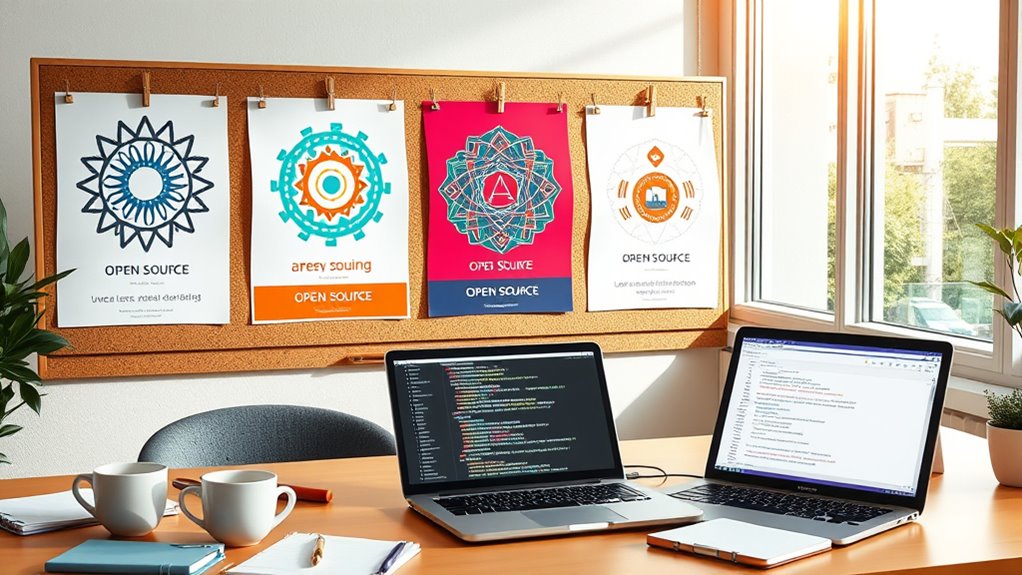If you’re new to open-source, you might wonder where to start this weekend. There are several projects designed specifically for beginners, offering straightforward tasks and supportive communities. Choosing the right one could help you build confidence and gain practical skills. Curious about which projects could be a good fit for your current experience? Keep exploring to find options that match your interests and goals.
Key Takeaways
- Look for projects labeled “good first issue” or “beginner-friendly” on platforms like GitHub.
- Choose projects with clear documentation and active community support for easier onboarding.
- Start by fixing typos, updating documentation, or resolving minor bugs to build confidence quickly.
- Join project chat channels or forums to ask questions and understand contribution workflows.
- Focus on small, manageable tasks that can be completed over the weekend to gain practical experience.

Getting started as a new developer can be intimidating, but contributing to open-source projects is one of the best ways to build your skills and gain real-world experience. Many projects offer mentorship opportunities, which are perfect for beginners eager to learn from experienced contributors. These mentorship programs connect you with seasoned developers who can guide you through the process, answer your questions, and help you navigate the project’s codebase. Additionally, many open-source projects prioritize providing beginner-friendly documentation, making it easier for newcomers to understand how to contribute. Clear, well-organized documentation helps you get up to speed quickly and reduces the frustration often associated with tackling complex codebases for the first time. Familiarizing yourself with vetted open-source projects can boost your confidence and ensure you’re contributing to reputable initiatives.
Getting started as a new developer is easier with mentorship and beginner-friendly documentation in open-source projects.
Once you select a project, start by exploring its issues or feature requests labeled as “good first issue” or “beginner-friendly.” These tags are specifically designed to help new contributors find manageable tasks that build confidence and familiarity with the project. Don’t hesitate to read through the project’s documentation thoroughly; understanding the project’s goals and standards will help you contribute more effectively. Many open-source communities encourage questions and are happy to support newcomers, so don’t be shy about reaching out for guidance. Engaging with the community through forums, chat channels, or issue comments accelerates your learning and helps you integrate into the project.
When contributing, focus on small, manageable changes first. Fix typos, improve documentation, or tackle minor bugs. These tasks are less intimidating and give you practical experience with the project’s workflow, such as branching, pull requests, and code reviews. As you gain confidence, you can take on more complex features or refactorings. Remember, every contribution counts, no matter how small, and it’s a great way to build your portfolio and reputation in the developer community.
Most importantly, stay patient and persistent. Open-source contributions can sometimes involve back-and-forth discussions and revisions, but each interaction is a learning opportunity. Over time, you’ll develop a better understanding of software development practices, version control, and collaborative workflows. With the support of mentorship opportunities and beginner-friendly documentation, you’ll find that contributing to open-source isn’t just a way to give back — it’s a powerful step toward becoming a confident, skilled developer. So, pick a project that excites you, take the plunge this weekend, and start making meaningful contributions today.
Conclusion
So, why not spend your weekend pretending you’re changing the world one line of code at a time? Immerse yourself in these beginner-friendly projects and bask in the glory of “meaningful” contributions while secretly just fixing typos or updating docs. Remember, every small step counts—especially when you’re still figuring out what a pull request even is. Before long, you’ll be a seasoned open-source hero, or at least, slightly less clueless. Happy coding!









